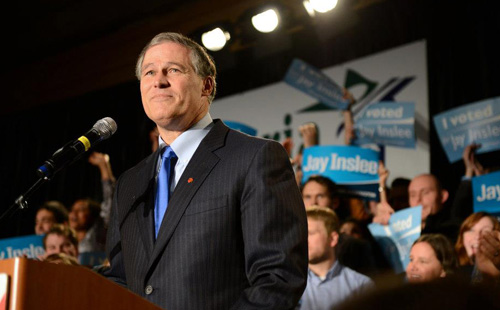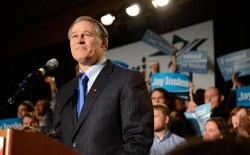He hasn’t even gotten his foot in the door of the mansion yet and already Jay Inslee is being touted as the nation’s greenest governor — and being pushed to live up to that reputation.
Inslee, a Democrat, won election in Washington state earlier this month after getting unprecedented support from state and national environmental groups. They’re counting on him to keep up the advocacy for climate action and clean energy that he demonstrated during more than 15 years in Congress.
But on one critical environmental topic, Inslee has been largely silent: coal trains and coal export terminals. During the campaign, he, like his Republican opponent, stayed neutral. In a June debate, he said, “My view is we need to evaluate all of the jobs prospects, both plus or minus, before we make a decision.” That sort of hedging prompted the Seattle alt-weekly The Stranger to make this demand the day after the election:
[S]tep away from your hedged position on those mile-long, toxic-dust-spewing coal trains from Montana that Big Coal wants to run through our state—and the city of Seattle—and then onward to Western Washington ports that will ship it off to energy-hungry China. The county that elected you needs you to get off the fence, stop talking about more studies, and start tangling in an effective, direct way with the coal-train pushers.
InsideClimate News has more on Inslee and coal trains:
[H]e will take office as one of the most controversial battles over the nation’s energy and environmental future is raging in his backyard—whether to make the Pacific Northwest a hub for exporting coal to Asia.
Companies are angling to build two export facilities in Washington State from which 100 million tons of coal would be shipped to China, Japan and South Korea a year—about the same as what the United States exports now from East Coast and Gulf ports. They’ve applied for permits and are in the beginning stages of a complex state and federal approval process. In Oregon, three more proposals are underway.
What Inslee might do depends on who you ask.
Environmentalists and other critics say Inslee is their best chance to block the coal ports, even though he has yet to take a position on them. Inslee won’t have veto authority, but he could push rigorous environmental reviews that could slow and complicate the permitting process or impose so many conditions that it would be difficult for developers to build the terminals.
Proponents say they aren’t worried. Job creation was a tenet of Inslee’s campaign in a state where the unemployment rate hovers above the national average. And the projects would create thousands of high-paying construction jobs. “Hopes are still high” for his backing, said Lauri Hennessey, a spokesperson for the Alliance for Northwest Jobs and Exports, which comprises about 40 coal companies, transportation firms, labor unions and regional business councils.
Al Gore recently told Grist that he believes Inslee “is going to handle this extremely well,” suggesting Inslee will be “skeptical about this giant export strategy of coal.”
Last year, in a conversation with Grist’s David Roberts, Inslee refused to take an official position on the issue, but gave some insight into his thinking:
He emphasized that as governor his first priority would be boosting economic development and job opportunities in the state. Clearly the port projects would create “some short-term jobs in construction and long-term jobs in operation,” he said.
But, he added, not all the economic ramifications of a development like a coal port are obvious. “What is the impact on local economies of [coal] trains going through every hour and a half?” he asked. Bellingham, for instance, is planning major redevelopment on its waterfront. How would a massive port, with dozens of trains arriving every day, belching noise and coal dust, affect that development, those jobs? “It’s worthy of thinking about,” he said.
Also worthy of consideration, he added, are the effects on manufacturing competitiveness. If the U.S. exports coal to China, he said, “they’ll use it to produce airplanes that compete with Boeing. I’ve got 80,000 people making airplanes here competing with 80,000 Chinese. Shipping them cheap, dirty electricity to subsidize their cheap airplanes may not be the best manufacturing strategy for the United States.”
By the time he’d gotten wound up, he sounded a bit less equivocal about the whole thing:
When we reduce the price of dirty electricity in China, we do two things: We subsidize their exports to us, making us less competitive, and we make it less likely that they’ll develop cleaner sources of energy. They get cheap electricity, we get pollution.
In regard to both Keystone XL and the coal ports, he lamented that “arguing about local siting decisions as a way to have a national energy policy is really frustrating and sad.”
That last comment may point to a way forward for Inslee on this issue: getting the feds involved. From InsideClimate again:
According to [Eric] de Place of Sightline, the most effective move Inslee could make from opponents’ perspective is to pressure federal officials to undertake an assessment that looks at the cumulative effects of building all five terminals on the region, the country and the world.
So far, the main federal agency involved hasn’t given any indication that it will do so—though it hasn’t ruled it out either.
Oregon Gov. John Kitzhaber (D) has taken this approach, calling for federal officials to do a big-picture review of plans to boost coal exports. De Place hopes Inslee and California Gov. Jerry Brown (D) will do the same, creating a bloc of opposition along the West Coast.
The issue is only going to heat up over the coming year, as coal companies and their allies push for expedited export infrastructure while climate activists make stopping the coal trains a top priority — one for which some are willing to put their bodies on the line.




